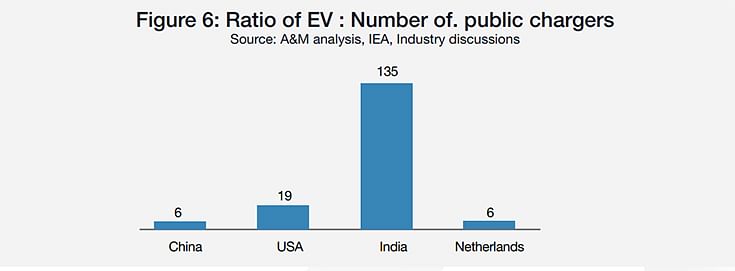India needs 13 lakh charging stations by 2030 to support EV mission: CII
To achieve a ratio of 1:40 charging infrastructure to EVs, India will need to install more than 400,000 chargers annually with a total of 1.32 million chargers till 2030.
Given the sustained growth of the Indian electric vehicle industry, which saw retail sales cross a million units (10,24,806 units) for the first time in a calendar year in 2022 and January-June 2023 numbers already 70% of that record total, EV demand can be further accelerated by expanding the charging infrastructure across the country.
While the number of the EV charging station installations has been growing over the past year, the charging network still remains far short of what is needed to increase EV adoption and reduce range anxiety for EV users.
A report released by the Confederation of Indian Industry (CII) on ‘Charging Infrastructure for Electric Vehicle’ states that a firm push by the governments at the Central and State levels for EVs has increased consumer choice. Along with better awareness, there has been an exponential growth in EV uptake in 2022, resulting in a 210% year-on-year increase (CY2021: 331,470 units).
Going by this trend, even in a business-as-usual (BAU) scenario of 40% YoY growth, about 106 million EVs will be sold every year by 2030. To achieve a ratio of 1:40 charging infra to EVs, India will need to install more than 400,000 chargers annually with a total of 1.32 million chargers till 2030.

To achieve a ratio of 1:40 charging infrastructure to EVs, India will need to install more than 400,000 chargers annually with a total of 1.32 million chargers till 2030.
The CII report, done in collaboration with Edelman Global Advisory (EGA), is the second in series of CII reports on ‘Roadmap for Future Mobility 2030’.
Vipin Sondhi, Chairperson – CII National Committee on Future Mobility 2022-23 (last year) and former MD and CEO, Ashok Leyland and JCB said, “The government of India has set the ball rolling on accelerated adoption of EVs, aiming to achieve sales penetration of 30% for private cars, 70% for commercial vehicles, and 80% for two- and three-wheelers by 2030. The foundation for this will be laid by the creation of robust charging infrastructure.”
“This presents a huge opportunity for India and the Indian industry”, said Sondhi. He has urged a conducive policy environment, at the Centre, and in the States to enable Indian startups, MSMEs, and large companies to rapidly roll out EV charging infrastructure across the country. The sheer extent of charging infrastructure that will need to be set up in India provides the economies of scale needed to turn the country into a global manufacturing hub for charging stations, in turn leading to job creation and exports.
 India currently has an estimated EV/public charger ratio of only 1:135 compared to the global ideal ratio of around 6-20 EVs per public charger. (Alvarez & Marsal report).
India currently has an estimated EV/public charger ratio of only 1:135 compared to the global ideal ratio of around 6-20 EVs per public charger. (Alvarez & Marsal report).
Driving away range anxiety with EV charging infra
One of the biggest barriers to increased EV adoption in India is range anxiety amongst EV users, who are concerned whether their eco-friendly vehicle will run out of charge before their reach their destination. Their worries are particularly heightened when travelling inter-city or on highways. At present, India’s public EV charging infrastructure remains poor when compared to China, Netherlands or the USA. As per an Alvarez & Marsal study of the industry last year, India currently has an estimated EV/public charger ratio of only 1:135 compared to the global ideal EV/public charger ratio of around 6-20 EVs per public charger.
Tata Power is among the private sector companies which are accelerating the setting up of EV charging infrastructure across the country. The company, which claims it is the largest EV charging point operator with nearly 60% market share in India, has installed over 40,000 home chargers, 4,000 public and semi-public charging points, and 250 bus charging points. It is present in 550 cities and continues to expand. In a new growth strategy, Tata Power is now setting up charging stations at budget hotels. The most recent has been the installation of 16 chargers -- 8 fast DC (CCS-II) chargers and 8 AC (Type II) – across 8 locations of Le Roi Hotels and Resorts.
CII report recommendations
Some of the key recommendations emanating from the report are:
- Single-window mechanism to approve setting up of the public charging infrastructure along with timely electricity connections & reliable supply by DISCOMS to ensure a higher density of charging infrastructure and quality of service.
- Rationalisation of demand charges by linking it to actual utilisation will also enable CPOs to ensure viability till the time demand picks up in the coming years.
- Integrate charging networks into town planning, for both greenfield as well as brownfield development.
- Create an SPV for deployment of charging infra networks in Tier 2, Tier 3 towns as well as in rural areas. Also, good road network may help in building consumer confidence to adopt EVs.
- Majority of components for EV charging stations, particularly Level 3 DC fast chargers are imported, including electronic components and semiconductors. This amounted to more than US$ 5,800 million in the previous year (Apr-Dec 2022). The government, under the Aatmanirbhar Bharat programme, may consider PLI-like incentives to promote manufacturing of components for EV charging stations. This will not only reduce India’s dependency on imports but also tap the opportunity to become a global supply hub for EVSE (electric vehicle supply equipment).
- EVs, if not powered through 100% green source of energy, will defeat the whole purpose of the mobility transition. Use of 100% renewables for charging stations should be made mandatory by promoting open access, DRE through the C&I sectors and net metering combined with local energy storage system and grid storage system.
ALSO READ:
EV sales in India charge past 700,000 units in first six months of 2023
Tamil Nadu adopts cluster-based approach to develop charging infra
Seven global carmakers join forces for high-powered EV charging network across N America
RELATED ARTICLES
Cosmo First diversifies into paint protection film and ceramic coatings
The Aurangabad, Maharashtra-based packaging materials supplier is leveraging its competencies in plastic films and speci...
JSW MG Motor India confident of selling 1,000 M9 electric MPVs in first year
The 5.2-metre-long, seven-seater luxury electric MPV, which will be locally assembled at the Halol plant in Gujarat, wil...
Modern Automotives targets 25% CAGR in forged components by FY2031, diversifies into e-3Ws
The Tier-1 component supplier of forged components such as connecting rods, crankshafts, tie-rods, and fork bridges to l...






 30 Jul 2023
30 Jul 2023
 13935 Views
13935 Views








 Autocar Professional Bureau
Autocar Professional Bureau




